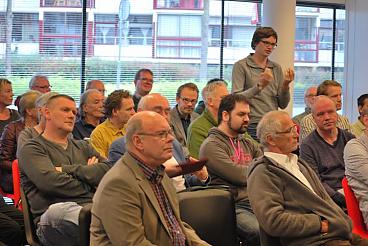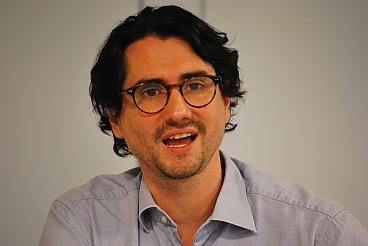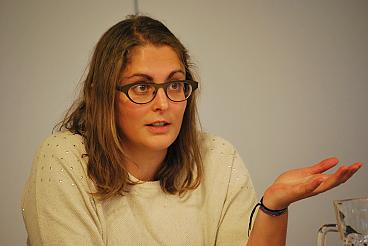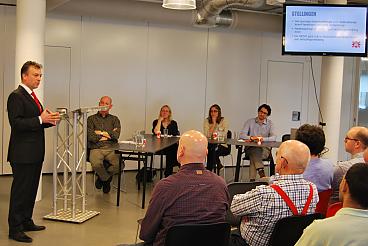Stop legalised profit-smuggling!
Stop legalised profit-smuggling!

Multinationals are avoiding paying $250 billion per year in taxes by making use of legalised profit-smuggling routes. The losses come at the expense of workers, small businesses and developing countries. Time to raise public awareness and to take action, as could be seen at last Saturday's debate at the SP's De Moed headquarters, when a public discussion was held under the title 'The Netherlands: an amusement park for big capital'.

Rodrigo Fernandez
The Netherlands is home to some 12,000 mailbox companies. They produce nothing, but earn a cool $4 trillion a year in turnover by locking capital away from the countries where their economic activities do take place. One speaker, financial geographer Rodrigo Fernandez, told the audience that 'On paper the Netherlands and Luxembourg look like the world's biggest investors, thanks to these mailbox companies.'
Fernandez also knows how it got this way. 'It began with international treaties aimed at preventing multinationals from being subject to double taxation, once in the country where a subsidiary is based and once in the parent corporation's homeland. These treaties are now being misused to avoid having to pay any taxation anywhere. Before 1980 shareholders used to put critical questions if they heard aboiut such taxation constructions. Now they put critical questions if the company doesn't use them.'

Indra Römgens
The next speaker, Indra Römgens, works for the Foundation for Research into Multinational Enterprises, known by its Dutch acronym, SOMO. She tells the story of Eldorado Gold, a Canadian firm which developes a gold mine in Greece, completely against the expressed wishes of the local people, who are concerned at the prospect of massive environmental damage. The firm made loans from Dutch subsidiaries. These loans were then reloaned, from another subsidiary in Barbados. The loans made by the subsidiaries in the Netherlands were tax-deductible, while the firms receiving the profits in Barbados paid 0% on these revenues. Meanwhile in Greece Eldorado Gold is calling for tax deductions on the loans from its own subsidiaries. ‘With our mailbox companies we're therefore facilitating Greece's losses', says Römgens. (Read a full account of the affair in SOMO's report Fool's Gold) In reponse to critical comments, Eldorado Gold CEO Paul Wright says 'Every firm works like that and it's completely legal.' In its own annual report the company warns shareholders that while they are constantly moving profits around, it can't be ruled out that they might have to pay taxes at one time or another.

Esmé Berkhout
Esmé Berkhout, taxation expert at Oxfam Novib, explained how her organisation helps partners in developing countries to monitor their governments. 'But they ask us to deal with the Dutch government,' she added. 'Developing countries lose a minimum of a hundred billion dollar a year through tax avoidance. More than they receive in aid.' The European Union understands that something has to be done about this, as you can see from the complaint against the Netherlands over Starbucks, but the member states are blocking any solution. In the ongoing race to the bottom it's not the governments which are the winners, but the multinationals and their shareholders. Berkhout advocates more transparency, from both corporations and governments. So that we know better how the whole process works. And along with that we can create more public awareness that this legalised profit smuggling is harmful for all of us.

Arnold Merkies takes the floor
SP Member of Parliament Arnold Merkies gave the political perspective. In the Dutch national parliament the SP and the Green Left regularly draw attention to tax avoidance, but other parties beat around the bush, while the Finance Ministry denies everything, adding that the deal with Starbucks is legally permissible. But ethically it's totally wrong! So we need different laws. Yet what happens? Parliament votes in favour of a motion from the far right which says that the Netherlands can't be called a tax haven. The government points to the OECD's list of tax havens, which is now totally empty! They include only countries which have fewer than twelve taxation treaties with other countries. The tax havens therefore conclude twelve treaties with each other and voila!
Former SP leader Jan Marijnissen led the discussion during the debate and posed the question as to what we should do to prevent a race to the bottom. Indra Römgens suggested that the EU set a minimum level of profit tax, but Marijnissen warned that if it was left to the EU it would be set too low. Others argued that the recently developed OECD action plan should be supported. In the view of Rodrigo Fernandez, to be effective treaties have to be concluded on the world level, which means through the United Nations. Arnold Merlies wants to see 'the Netherlands set a good example, otherwise we can't criticise other countries. In addition, naming and shaming works really well, especially via social media.' And we need to use terms that sounds less innocent than 'tax avoidance' and 'haven'.
'Legalised profit-smuggling' would be a start.
Watch SOMO's cartoon about profit-smuggling by Apple. https://player.vimeo.com/video/143721806
- See also:
- World
